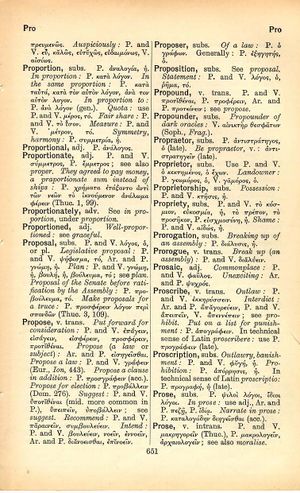propraetor: Difference between revisions
Ξένοις ἐπαρκῶν τῶν ἴσων τεύξῃ ποτέ → Bene de extero quid meritus exspectes idem → Hilf Fremden und dereinst wird Gleiches dir geschehn
(6_13) |
(3_10) |
||
| Line 6: | Line 6: | ||
{{Lewis | {{Lewis | ||
|lshtext=<b>prō-praetor</b>: ōris, m. (also prōprae-tōre or prō praetōre, indecl.),<br /><b>I</b> a [[magistrate]] in the times of the [[republic]], [[who]], [[after]] having administered the prœtorship one [[year]] in [[Rome]], [[was]] sent in the [[following]] [[year]] as prœtor to a [[province]] [[where]] [[there]] [[was]] no [[army]], a proprœtor ([[class]].).—Form [[propraetor]]: cum bella a propraetoribus administrantur, Cic. Div. 2, 36, 76.—Form pro praetore, Sall. J. 103, 4: prorogatum Tubulo est, ut pro praetore in Etruriam succederet Calpurnio, Liv. 27, 22, 5.—<br /><b>II</b> One [[who]] administers the prœtorship of a [[province]] in the [[absence]] of the prœtor: Aulo fratre in castris pro praetore relicto, Sall. J. 36, 4: quem pro praetore in castris relictum [[supra]] diximus, id. ib. 37, 3; Liv. 10, 25, 11; 29, 6, 9; Tac. A. 2, 66 al.; Caes. B. G. 1, 21. | |lshtext=<b>prō-praetor</b>: ōris, m. (also prōprae-tōre or prō praetōre, indecl.),<br /><b>I</b> a [[magistrate]] in the times of the [[republic]], [[who]], [[after]] having administered the prœtorship one [[year]] in [[Rome]], [[was]] sent in the [[following]] [[year]] as prœtor to a [[province]] [[where]] [[there]] [[was]] no [[army]], a proprœtor ([[class]].).—Form [[propraetor]]: cum bella a propraetoribus administrantur, Cic. Div. 2, 36, 76.—Form pro praetore, Sall. J. 103, 4: prorogatum Tubulo est, ut pro praetore in Etruriam succederet Calpurnio, Liv. 27, 22, 5.—<br /><b>II</b> One [[who]] administers the prœtorship of a [[province]] in the [[absence]] of the prœtor: Aulo fratre in castris pro praetore relicto, Sall. J. 36, 4: quem pro praetore in castris relictum [[supra]] diximus, id. ib. 37, 3; Liv. 10, 25, 11; 29, 6, 9; Tac. A. 2, 66 al.; Caes. B. G. 1, 21. | ||
}} | |||
{{Georges | |||
|georg=prō-[[praetor]], ōris, m. u. [[pro]] praetore, der [[nach]] [[Verwaltung]] der [[Prätur]] [[als]] [[Statthalter]] in eine [[Provinz]] [[ohne]] milit. [[Kommando]] geschickte [[Prätor]], der Proprätor, Cic. u.a. | |||
}} | }} | ||
Revision as of 09:33, 15 August 2017
English > Greek (Woodhouse)
subs.
P. ἀντιστράτηγος, ὁ (late). Be propraetor, v.:ἀντιστρατηγεῖν (late).
Latin > English (Lewis & Short)
prō-praetor: ōris, m. (also prōprae-tōre or prō praetōre, indecl.),
I a magistrate in the times of the republic, who, after having administered the prœtorship one year in Rome, was sent in the following year as prœtor to a province where there was no army, a proprœtor (class.).—Form propraetor: cum bella a propraetoribus administrantur, Cic. Div. 2, 36, 76.—Form pro praetore, Sall. J. 103, 4: prorogatum Tubulo est, ut pro praetore in Etruriam succederet Calpurnio, Liv. 27, 22, 5.—
II One who administers the prœtorship of a province in the absence of the prœtor: Aulo fratre in castris pro praetore relicto, Sall. J. 36, 4: quem pro praetore in castris relictum supra diximus, id. ib. 37, 3; Liv. 10, 25, 11; 29, 6, 9; Tac. A. 2, 66 al.; Caes. B. G. 1, 21.
Latin > German (Georges)
prō-praetor, ōris, m. u. pro praetore, der nach Verwaltung der Prätur als Statthalter in eine Provinz ohne milit. Kommando geschickte Prätor, der Proprätor, Cic. u.a.

